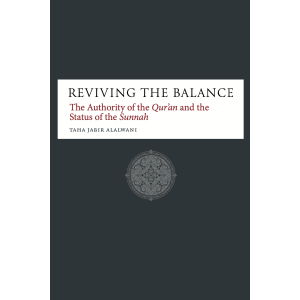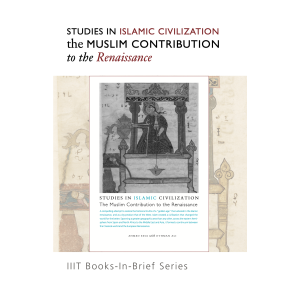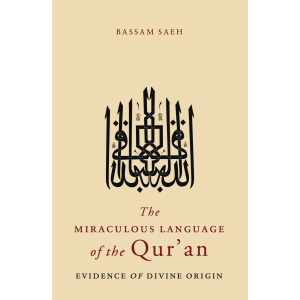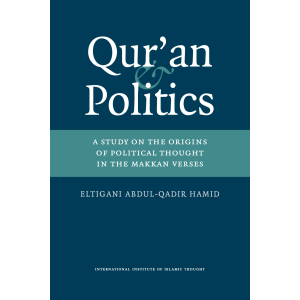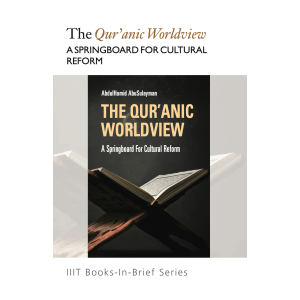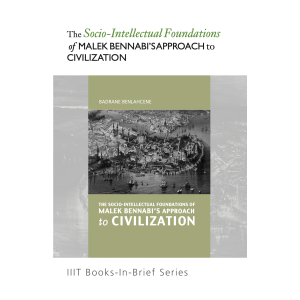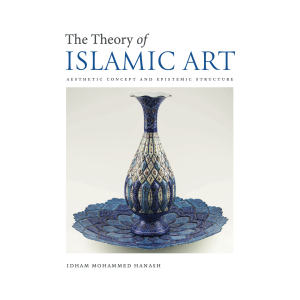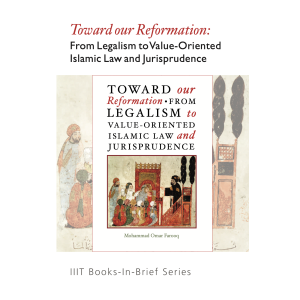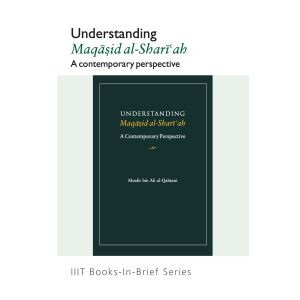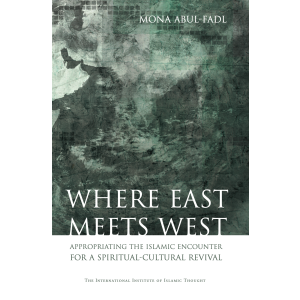-
Reviving The Balance: The Authority of The Qur’an and The Status of The Sunnah
$0Overview
This work studies the position of the Sunnah in Islam and its fundamental relationship to the Qur’an. The author carefully examines the sensitive issue of the development of the oral and written traditions, the problems scholars faced despite painstaking work verifying the authenticity of reports, the character of narrators, etc. and the evergrowing complexity of a body of narratives that were making the simplicity and clarity of the Prophet’s life, words, and actions, a burgeoning maze of information. Taking the praiseworthy intention and effort to emulate the Prophet into account, the author nevertheless makes the case that once the Sunnah had been collected, the Muslim community began to neglect the Qur’an in favor of narrations of what the Prophet had done and said on the pretext that such narratives “contained” the Qur’an. Eventually they then abandoned the Sunnah narratives in favor of Islamic jurisprudence on the pretext that Islamic juristic texts tacitly included both the Qur’an and the Sunnah. It is with the aim of restoring the relationship between the two that this work has been written, that is, the Prophetic Sunnah must be tied inextricably to the Qur’an in a way that allows for no contradiction or conflict between the two, to avoid misapplication and abuse of hadith, and to meet the requirements and challenges of a new age.
-
Soulful Deeds: A Roadmap for Teenage Muslim
$15Overview
Soulful Deeds: A roadmap for Teenage Muslims: is is an educator’s guide aimed at a teenage audience who is on the cusp of discovering life. It is our duty to guide teenagers in the right direction and this book provides the tools to undertake this mission. As part of an inclusive learning, various teaching tools and concepts have been developed as sub-concepts from the main Islamic philosophy of truthfulness. To help students in their intrinsic search for self and other necessities, they must improve their metacognitive skills that are inherent in every human being. The metaprocess, which indicates going beyond our present state or capacity, is an important factor in developing several areas of learning such as insight and awareness, curiosity and creativity, as well as the ability to reach out to others. Young people must learn to live in a conscious state of global awareness of Allah and remain faithful to the teachings of the Quran. This educational book, with its variety of outstanding concepts and activities, aims to embark students on a journey towards truth so that they realise their true worth as representatives of Allah on earth, for truth is the central idea that guides all good intentions and good deeds, and which ultimately transforms the doers of good deeds into excellent beings.
Dr. Ammaara Uddeen Maniacara holds a PhD in the Philosophy of Religious Studies, a Masters cum laude degree in Islamic Studies, BA in Communication Science as well as a Certificate in Intercultural and Interfaith Programme for Ethics Education. She also holds a Masters’ degree in French Language in addition to Certificates in Public Relations, Journalism and atelier d’écriture. Additionally, she is an international translator of Islamic issues and has authored several Islamic books in French. She has more than
20 years of experience in teaching, which is her main profession. She is also a Neuro Linguistic Programming practitioner and an Islamic counsellor for children, adolescents, and ladies. Her mission is to accompany and guide them in their intrinsic search for self and other necessities, with love and happiness, to enable them to integrate the society with sound values. -
STUDIES IN ISLAMIC CIVILIZATION the MUSLIM CONTRIBUTION to the Renaissance
$0Overview
Studies in Islamic Civilization draw upon the works of Western scholars to make the case that without the tremendous contribution of the Muslim world there would have been no Renaissance in Europe. For almost a thousand years Islam was arguably one of the leading civilizations of the world spanning a geographic area greater than any other.
It eliminated social distinctions between classes and races, made clear that people should enjoy the bounties of the earth provided they did not ignore morals and ethics, and rescued knowledge that would have been lost, if not forever, then at least for centuries. The genius of its scholars triggered the intellectual tradition of Europe and for over seven hundred years its language, Arabic, was the international language of science.
Strange then that its legacy lies largely ignored and buried in time. In the words of Aldous Huxley, Great is truth, but still greater, from a practical point of view, is silence about truth. By simply not mentioning certain subjects… propagandists have influenced opinion much more effectively than they could have by the most eloquent denunciations.
Studies in Islamic Civilization is a compelling attempt to redress this wrong and restore the historical truths of a golden age that ushered in the Islamic renaissance, and as a by-product of that of the West. In doing so it gives a bird s eye view of the achievements of a culture that at its height was considered the model of human progress and development.
-
The Miraculous Language of the Qur’an: Evidence of Divine Origin
$0Overview
This study illustrates why the language of the Qur’an is miraculous, unique, and evidence of divine authority. The author compares the language of the Qur’an with the language of preIslamic poetry, the Prophet’s words (hadith), and the language of the Arabs both past and present, to demonstrate that although the Qur’an was revealed in Arabic it was at the same time an Arabic which was entirely new. Original and early Muslim audiences viewed this as miraculous and responded to the Qur’an’s words, sounds, rhythms, etc. in a manner consistent with a deeper appreciation of its beauty and majesty which modern ears, trained by familiarity, and despite being surrounded by all manner of dictionaries and studies, are at a loss to capture. The author attempts to remove this veil and present the Qur’an to readers as if hearing it for the first time, to bring to life some of this wonder. In doing so he guides readers to appreciate the beauty of the Qur’an, to become more immersed in it, and to have a clearer understanding of its structure and flow. Devoting special attention to Surah Al Muddaththir (Chapter 74), to underpin his analysis, Saeh thus brings the Revelation to life, to demonstrate that each surah has distinct features and characteristics that make it stand out uniquely within the design and sweep of the whole.
-
The Qur’an and Politics: A Study of the Origins of Political Thought in the Makkan Quran
$0Overview
Eltigani Abdelgadir Hamid’s “The Quran & Politics” is a thorough inquiry into the beginnings of political philosophy inside the Makkan Quran, exposing the intricate link between Islamic scripture and political ideology. This scholarly treatise digs into the verses revealed in Makkah during Prophet Muhammad’s early mission, offering insight into the fundamental ideas that set the cornerstone for Islamic political philosophy.
Eltigani Abdelgadir Hamid contextualizes the research by evaluating the verses revealed in Makkah during a period of social, political, and spiritual transformation. The book reveals the political truths hidden in the Quranic revelations, giving readers a comprehensive knowledge of how these verses impacted the fledgling Muslim society.
The book’s main focus is on finding the origins of political philosophy in the Quran. Eltigani Abdelgadir Hamid painstakingly analyzes verses dealing with governance, justice, and the individual-state interaction. The reader is taken on a scholastic journey to unearth the seeds of Islamic political philosophy sown in the early revelations. -
The Qur’anic Worldview: A Springboard For Cultural Reform
$0Overview
Looking back at the various stages of Islamic historical development, AbuSulayman puts forward a thesis that focuses on the recovery of what is termed the Quranic worldview. Our faith will only be complete when we have become utterly sincere in our love for God, a love expressed in a pure, passionate love for goodness and truth in this world. It was the strict internalization of this perspective and close adherence to the principles of the Quran which AbuSulayman contends, played a key factor in galvanizing the devout and intensely Godconscious followers of fledgling Islam to achieve the successes that they once did, the profound historical and global impact of which is still the subject of much study and admiration today.
-
The Socio-Intellectual Foundations of Malek Bennabi’s Approach to Civilization
$0Overview
Since the publication of Samuel Huntington’s “The Clash of Civilizations” concern about civilization has been reintroduced into the debate on the world order. Malek Bennabi (1905-1973), prominent Algerian thinker and great Muslim intellectual, intently focused on unravelling the causes of Muslim decline and the success of Western civilization and culture. The key problem he theorized lay not in the Qur’an or Islamic faith but in Muslims themselves. The author investigates Bennabi’s approach to civilization and the fundamental principles drawn, using metatheorizing methodology. In doing so he sheds further light on perhaps one of the more intriguing elements of Bennabi’s theory, that civilization is governed by internal-external and social-intellectual factors and that an equation can be generated for civilization itself. This equation of (Man+Soil+Time) = Civilization and of which religion, according to Bennabi, forms the all-important catalyst, is explained and its significance in terms of the reversal of Muslim decline evaluated.
-
The Theory of Islamic Art: Aesthetic Concept and Epistemic Structure
$0Overview
Divine oneness as the principle of beauty is perhaps quintessentially Islamic artistic expression and experience and what it celebrates. Why has Islamic art evolved as it has, what forms does it take, what is the logic underlying it? What message is the Muslim artist attempting to convey, what emotion is he seeking to evoke? This work views Islamic art as a subject of archeological study and treats its evolution as part of the historical study of art in the broader sense. At the same time, it paves the way for an epistemological shift from viewing Islamic art as a material concept having to do with beautiful rarities and relics that have grown out of Islamic cultural and artistic creativity, to a theoretical concept associated with a vision, a principle, a theory and a method. This theoretical concept provides the intellectual and cultural foundation for a critical philosophical science of Islamic artistic beauty to which we might refer as ‘the science of Islamic art,’ or ‘the Islamic aesthetic’ that evaluates visual artistic creations in terms of both beauty and practical usefulness. In the process the study also explores orientalist misconceptions, challenging some of the premises with which it has approached Islamic art, with judgement rooted in a cultural framework alien to the spiritual perspective of Islam.
-
Toward Our Reformation: From Legalism to Value-Oriented Islamic Law and Jurisprudence
$0Overview
In Toward Our Reformation, the author contends that at the heart of the Muslim predicament lies ignorance and/or a lack of commitment to core Islamic values. Mohammad Omar Farooq advocates for a return to what he calls a “value-oriented” approach. We learn that what we consider to be the Shari¢ah today is actually an original hub enveloped in a labyrinthine shroud of scholastic views and deductions, which in effect serves to hinder the development of Muslims. He argues that to extravagantly rely on questionable hadith and fallacious implementation of hudud law betrays the spirit of the Qur’an and the Prophet’s message. The consequence is a blatant abuse of Muslims. The author explores this misapplication of hudud law and, therefore, this abuse.
-
Understanding Maqasid al-Shari’ah: A Contemporary Perspective
$0Overview
Musfir bin Ali al-Qahtani’s work contributes to the ever growing body of scholarly literature in the field of maqasid al-Shariah (higher objectives of Islamic law).
Understanding Maqasid al-Shariah calls for the development of a juridical sense that is finely tuned to the higher objectives and purposes of Islamic rulings, the aims of which are the formulation of a new methodology in understanding the revealed texts and the reform of Muslim thought and its application.
The author draws attention to the importance of understanding various levels of maqasid, including distinguishing between primary aims (al-maqasid al-asliyyah) and secondary aims (al-maqasid al-tabiah).
-
Where East Meets West: Appropriating the Islamic Encounter for A Spiritual-Cultural Revival
$0Overview
The fate of civilization lies in the balance of culture, not power. This penetrating work argues that the terms of the culture of our times will determine the future of politics and societies. Islam continues to be, as much as it was in the past, at the hub and crossroads of contemporary civilization. The difference from a historical perspective, lies in the West’s control of the political setting, the primary factor in qualifying the terms of today’s civilization, and in setting its pace and direction accordingly.


